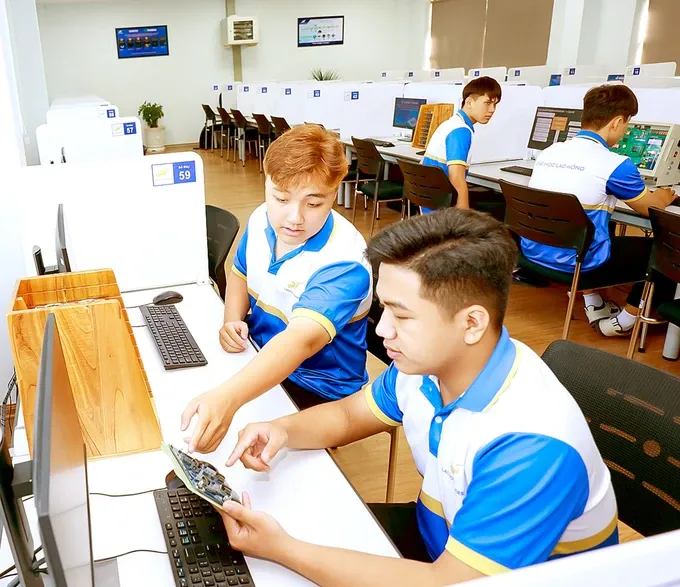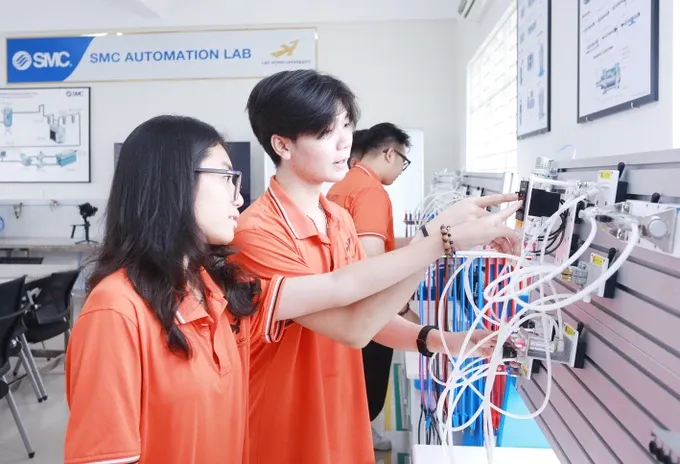
In the mutual-benefit relationship between universities and corporations, the former assumes a pivotal role, functioning as central administrators of educational activities, while simultaneously facilitating connections between students and industry. Conversely, enterprises adopt a more proactive stance in the development and cultivation of human resources aligned with their strategic growth objectives, encompassing significant advantages for students.
During the 2021-2025 period, Vietnam National University – Ho Chi Minh City (VNU-HCM) is strategically amplifying its engagement with enterprises through public-private partnership models, aiming to attract industry participation in infrastructural development and to optimize the delivery of high-quality human resources development, scientific research, and applied innovation.
Throughout this timeframe, VNU-HCM and its corporate partners have jointly executed numerous research and technology transfer initiatives, with nearly 230 projects delivering impactful solutions to industry challenges related to artificial intelligence, big data analytics, and automation in production management, energy, and environmental domains.
The outcomes of these collaborative ventures have demonstrably enhanced enterprise productivity, optimized operational costs, and fortified market competitiveness. A salient achievement in the VNU-HCM-industry partnership is the establishment of the VNU-HCM Development Fund, which has garnered nearly VND400 billion (US$15.65 million) in support of student scholarships and initiatives.
Driven by a commitment to fostering advanced, multidisciplinary human capital as well as research-driven innovation and technology transfer, HCMC University of Industry (IUH) prioritizes the cultivation of robust collaborative networks with domestic and international enterprises.
Over the past decade, IUH has forged formal partnerships with over 2,300 enterprises. Numerous Japanese, German, Korean, and leading Vietnamese corporations have contributed hundreds of billions of VND through scholarship endowments, laboratory construction, and the provision of advanced facilities and equipment for practical training.
Lac Hong University has similarly pursued strategic partnerships with industry to elevate educational standards and cultivate high-quality human resources. Notably, the university has established collaborative frameworks with entities such as Synopsys (the US), Onsemi Vietnam, SMC Corporation (Japan), and Fusheng Group (Taiwan - China), resulting in the establishment of state-of-the-art laboratories and practical training facilities valued at tens of billions of VND.

Head Bui Thi Hong Hanh of the Department of Foreign Affairs and Project Development at VNU-HCM highlights 30 years of expanded collaboration with authorities and enterprises, yielding significant gains in human capital, research, and community engagement.
This partnership annually places 20,000 graduates in the labor market of HCMC and the South. Enterprises support VNU-HCM with internships, labs, and software, enhancing student skills and employability. Industry input improves curriculum quality, ensuring graduates meet market demands. Such collaborations bridge the gap between academia and industry, fostering a skilled workforce that drives regional development and innovation.
President Phan Hong Hai of IUH emphasizes the mutual benefits of these partnerships, which address the misalignment between academic training and industry demands, while facilitating enterprise access to requisite human capital. Notably, students gain invaluable internship and practical training opportunities, fostering real-world skills and enhancing employability.
General Director Le Bao Anh of Construction Corporation No. 1 highlighted the recent $1 million collaboration with HCMC University of Technology (HCMUT), emphasizing the critical role of high-quality human capital in the success of strategic infrastructure projects. This partnership is designed to cultivate a new generation of engineers equipped with advanced technical expertise, innovative mindsets, and the capacity to undertake nationally significant projects.
In the realm of education, Construction Corporation No. 1 will collaborate with HCMUT to deliver flexible programs, from short-term courses to advanced specializations, enabling engineers to access cutting-edge technologies, particularly in urban and high-speed rail construction.
Furthermore, applied research and technology transfer initiatives will be prioritized, aiming to develop breakthrough technical solutions that enhance project quality and address the evolving demands of infrastructure development.
Assoc Prof Dr Nguyen Vu Quynh, Vice President of Lac Hong University, underscores the necessity of implementing comprehensive policy frameworks to maximize the benefits of public-private partnerships in higher education, thereby establishing a robust foundation for sustainable development.
Crucially, the refinement of legal frameworks and policy mechanisms is paramount, providing clear regulatory guidelines, ensuring transparency, and fostering investor confidence.
Concurrently, financial and tax incentive policies should be implemented, encompassing tax, credit, and land incentives for enterprises and educational institutions participating in collaborative projects, thereby stimulating investment in this domain.
























